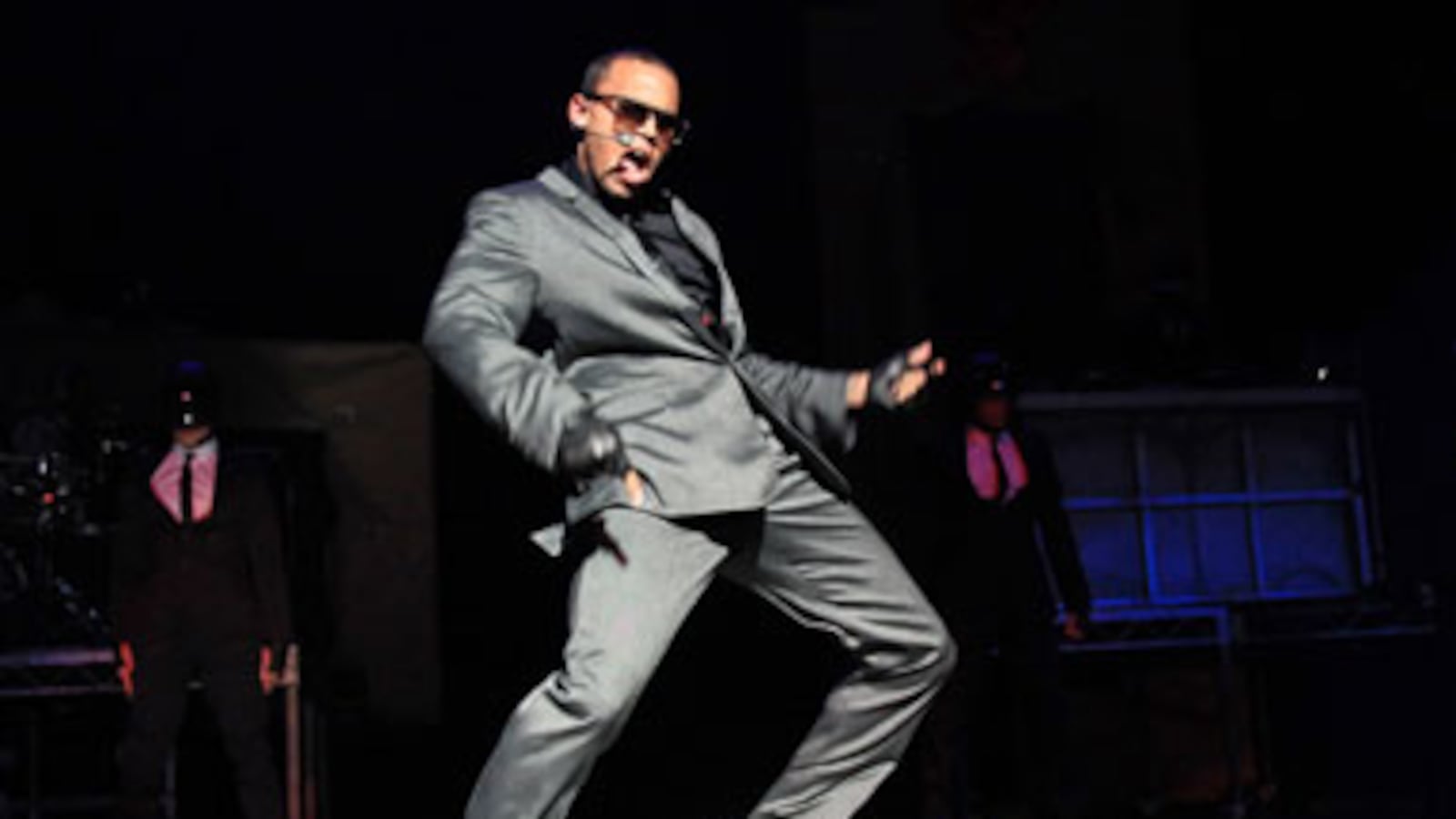Chris Brown had plenty of reasons to feel confident Monday. His latest single, "Look at Me Now"—which features turns from Lil Wayne and Busta Rhymes—had been doing brisk business during its first week on iTunes. (By midweek, it had also claimed the No. 4 spot on Billboard's Digital Songs chart.) Over the weekend, T-Pain had leaked, via Twitter, a song from his highly anticipated upcoming album rEVOLVEr that also featured a new contribution from the singer. And then there were the preparations and rehearsals for that plum spot on this week's Saturday Night Live for Brown to start looking forward to, as well—this all two years to the exact date of his Grammy-weekend assault against then-girlfriend Rihanna.

So why not dream big? Fresh from watching Usher's collaboration with the Black Eyed Peas during the Super Bowl halftime show, Brown got an idea, which he shared over Twitter on February 7: "Me and Lady Gaga [sic] should do a halftime show next year! What y'all think?"
Before long, the thought had perished from his social-media timeline—deleted in the manner of those who've reconsidered making a private thought public too soon—but not before it had been re-Tweeted by several of Brown's followers and noted on sites such as Rap-Up.com. It was, perhaps, a little much to hope for, this notion that Gaga might agree to team up with someone who had only just recently completed his court-ordered domestic-violence coursework (and especially during the same week she was set to bequeath an empowerment anthem to oft-bullied members of the LGBT community). But then again, who would have predicted that Brown's comeback train would be moving so swiftly after the Rihanna assault and its subsequent fallout (which included a much-criticized Larry King Live appearance)?
Indeed, one industry observer is now ready to say that his initial predictions about Brown's career were overly pessimistic. In an interview with The Daily Beast, Billboard Editorial Director Bill Werde recounted how, in the immediate aftermath of the Rihanna assault, he was asked by a reporter whether Brown's career was "over." After having added various qualifications—like a sage journalist—regarding the still-sketchy veracity of initial reports, Werde remembers saying that, "if what is being sort of circulated is true, then yes, I think his career is over." Now, Werde says, "at least in terms of his record sales: I just want to say, 'I was wrong.' I may not like being wrong; I may wish that I lived in a world where I wasn't wrong. But I was wrong."
Brown’s PR person reached out to The Daily Beast and proposed a profile about his comeback-in-process, though under the condition that any resulting piece would contain “no mention of Rihanna.”
Which is not to say there was never a reason for Werde and others to wonder about Brown's continuing viability. Looking at the numbers from Billboard's R&B/Hip-Hop chart, it's clear that the first three post-felony singles from Brown dropped, successively, like heavier and heavier rocks. Neither "I Can Transform Ya" (No. 11), nor "Crawl" (No. 54) nor "Sing Like Me" (No. 84)—all from Brown's album Graffiti—could manage to crack the Top 10 threshold on the same chart that "Forever" had once blasted out of before going No. 1 on the overall pop rankings (for 29 weeks, starting back in 2008).
Now, though—as Brown's publicity machine works up a full head of steam in advance of the singer's next album, due on March 22—there is plenty of data to back up a revised assessment. F.A.M.E.—a titular acronym that now stands for the anodyne "Fans Are My Everything," as opposed to Brown's initial, more self-pitying trope "Forgiving All My Enemies"—has already landed two Top 5 singles on the R&B chart. (Those would be "Deuces," which went to No. 1 last September, and "No BS," which sat at No. 5 this week.)
"Radio ultimately only gets behind what their listeners tell them to get behind," Werde says. "Radio is so heavily researched at this point that—you know, radio as a group doesn't make a decision that 'Chris Brown is going to be on radio.' Radio focus-groups and focus-tests the crap out of everything they play to make sure that it's going to give them the highest audience—which is ultimately going to let them charge their advertisers the greatest amount.... He's crossed that threshold. If you're a big pop star and you want a lot of success, all you really need is radio." Werde's opinion is worth putting weight behind not merely because of his experience interpreting trends in the music business, but because of his doggedly impartial view. "I'm not saying anything that's a condemnation of Chris Brown. And I think domestic abuse is a terrible thing. I think most people think that. I'm just giving you the business lay of the land."
None of this means the broader public—which (for now) mostly stands outside of the ranks of pop music-obsessed Twitter folk—is actively aware that the Chris Brown comeback has effectively taken place already. "There's the public and there's music fans," Werde says. "The public doesn't buy records and the public doesn't listen to radio." The public does, however, watch television, which is why Brown's upcoming turn on SNL could prove so pivotal. This Saturday's live performance is, in a sense, a public audition in front of a non-music-specialist audience—during which no one will be required to download a song from iTunes or even turn on the radio. How it goes over could tell advertisers whether the singer still plays on TV, and whether the types of brand sponsorships Brown had once lined up—and then lost, after pleading not guilty—might make their own comeback.
That question of whether Chris Brown works as bigger-than-music promotional brand is still an open one. After asking for access to rehearsals this week, The Daily Beast was told by an NBC rep that SNL would be running a strictly closed set. Separately, however, Brown's PR person reached out to The Daily Beast and proposed a profile about his comeback-in-process, though under the condition that any resulting piece would contain "no mention of Rihanna." (At a loss to conceive of how one could write a profile of a comeback without noting why a comeback was necessary, The Daily Beast has not pursued that profile. Our independent attempts to reach a few notable lights within the ranks of hip-hop and R&B performers netted no replies, either.) This, finally, may be why Brown's publicists can require Rihanna-less writeups in exchange for access to Brown. The leading indicator for his comeback has already spoken via a clear, stereo signal. And absent a competing channel of voices, what radio says could wind up ruling by default.
Seth Colter Walls has been a senior reporter in "The Culture" section of Newsweek since 2009. Previously, he worked as a writer and editor at The Daily Star in Beirut, Lebanon, and as a reporter in The Huffington Post's DC bureau. He regularly contributes essays to The Awl, and is a graduate of both NYU and Columbia University.






